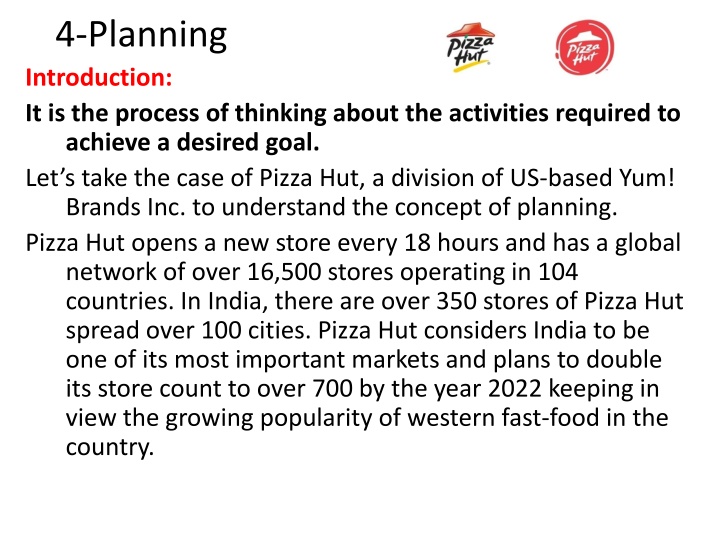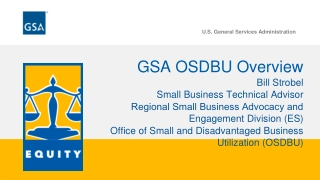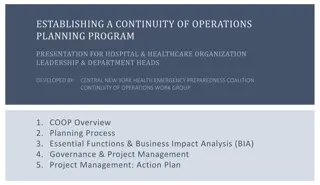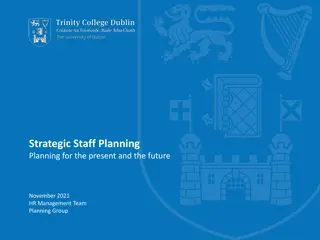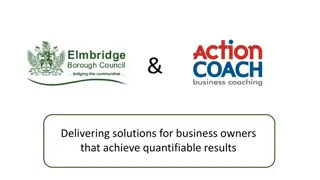Planning Process in Business
Planning is crucial in achieving organizational goals. Explore how Pizza Hut effectively plans for expansion in India and learn about the key features of planning in management.
Uploaded on Mar 21, 2025 | 0 Views
Download Presentation

Please find below an Image/Link to download the presentation.
The content on the website is provided AS IS for your information and personal use only. It may not be sold, licensed, or shared on other websites without obtaining consent from the author.If you encounter any issues during the download, it is possible that the publisher has removed the file from their server.
You are allowed to download the files provided on this website for personal or commercial use, subject to the condition that they are used lawfully. All files are the property of their respective owners.
The content on the website is provided AS IS for your information and personal use only. It may not be sold, licensed, or shared on other websites without obtaining consent from the author.
E N D
Presentation Transcript
4-Planning Introduction: It is the process of thinking about the activities required to achieve a desired goal. Let s take the case of Pizza Hut, a division of US-based Yum! Brands Inc. to understand the concept of planning. Pizza Hut opens a new store every 18 hours and has a global network of over 16,500 stores operating in 104 countries. In India, there are over 350 stores of Pizza Hut spread over 100 cities. Pizza Hut considers India to be one of its most important markets and plans to double its store count to over 700 by the year 2022 keeping in view the growing popularity of western fast-food in the country.
4-Planning Introduction: It is the process of thinking about the activities required to achieve a desired goal. From the last few years the company has also started online ordering through the website and app. Now, over 60 percent of home deliveries happen through online as compared to call-centres earlier especially since demonetisation in the country. It is evident from the above example, that its only through planning Pizza Hut has been able determine its desired success in India.
4-Planning Meaning: Planning is deciding in advance what to do, how to do and who is to do it. Planning bridges the gap where we are to where we want to go. It makes it possible for things to happen . Koontz & O Donnell
4-Planning Features of Planning: 1. Planning focuses on achieving objectives Planning is a purposeful activity as it seeks to realise the predetermined organisational goals by deciding upon the activities to be undertaken. Planning will be considered to be a futile exercise if it doesn t contribute towards achievement of the specific objectives for which an org. has been set up. For eg, a financial manager plans to raise a sum of rupees 100 crore in order to finance a new project or the production manager of a company manufacturing air conditioners wants to increase its daily production by 20% from next month.
4-Planning Features of Planning: 2. Planning is a primary function of management Planning precedes all functions of management i.e. organising, staffing, directing and controlling. Effective planning provides the framework within which managerial functions are performed. For eg, think of a situation where you have been asked to organise a meeting for the staff members. Is it possible for you to make the necessary arrangements unless the day of meeting is decided? This simple example highlights how planning lays down the foundation for all other functions.
4-Planning Features of Planning: 3. Planning is pervasive Planning is essential at all the levels of management and in all the departments of an organisation. However, the cope of planning varies at all the levels of management. Top level management carries out holistic (as a whole) planning, middle level about their own departments and lower level plans for day to day activities. For eg, the management of the school decides about the examination pattern to be followed during the academic year. The head of the examination department undertakes different types of planning like, making the date sheet, seating plan, invigilation duty chart and so on. At the same time the subject teachers are expected to plan the syllabus that will be tested in each examination.
4-Planning Features of Planning: 4. Planning is continuous Planning is continuous ongoing process as plans needs to be made on endlessly till an org. exists. The duration of the plan may be drawn for a specific period of time, may be for a month, a quarter or a year. If the plan is successful, the next step supporting the plan is taken. If the plan fails, there is a need to formulate a new plan.
4-Planning Features of Planning: 5. Planning is futuristic Planning is always done in relation to future to meet the desired goals effectively It is regarded as a forward looking function, which is based on forecasting Thus, planning involves looking ahead to analyse and anticipate the future events in the best interest of an org.
4-Planning Features of Planning: 6. Planning involves decision-making In real life situation a manager may have an option to choose among various alternatives in order to achieve the predetermined goals. As a result, planning becomes essential as it evokes rational thinking and helps to choose the most appropriate alternative among the various available alternatives in order to achieve the desired goals efficiently and effectively. For eg, a marketing manager may consider different types of sales promotion techniques like discount, rebate, free gifts, sampling, contest and so on in order to promote sales and eventually decide upon the best suited option.
4-Planning Features of Planning: 7. Planning is a mental exercise Planning is an intellectual activity based on logical thinking involving foresight, visualisation and judgmental rather than guess work. It is primarily a rational activity of thinking to determine the future course of action based on understandings of facts and figures. For eg, in order to plan a promotional strategy for a forthcoming release of a new movie, the marketing manager is expected to do a lot of brainstorming in terms of the popular television channels and programs with whom the producers should tie up, advertisement in print and electronic media, contests on social media etc.
4-Planning Planning Process: 1. Setting objectives The first step in the planning process involves laying down clear, specific and measurable objectives for the organisation as a whole and also with respect to each department. The objectives should be communicated down to each unit and employees at all levels as it helps to create a favorable environment and working towards the goal becomes easier for everyone.
4-Planning Planning Process: 2. Developing premises As planning is futuristic, the managers are required to make certain assumptions about the future in terms of customer preferences, competition, interest rates, state of economy, government policy etc. These assumptions are known as planning premises. The premises which are made set the limits within which the planning should be carried out. Thus, accurate forecasting is the essence of successful planning.
4-Planning Planning Process: 3. Identifying alternative course of actions The next step is to identify all the alternative courses of action which are available for consideration. The options so identified may either be the routine ones or employee participation may be encouraged to generate an innovative outlook.
4-Planning Planning Process: 4. Evaluating alternative courses The next step is to analyse the relative pros and cons of each alternative in light of their viability and significances. This is a very important step in planning as accurate analysis of various alternative is imperative for correct decision making
4-Planning Planning Process: 5. Selecting an alternative A prudent manager will always select an alternative that appears to be most viable, cost- effective and with least negative implications. He assess the alternatives based on his experience, judgment and at times intuition. Sometimes, a combination of plans appears to be most feasible.
4-Planning Planning Process: 6. Implement the plan The next step is to put the plan into action. This may be done by devising a suitable strategy Also, the sub plans may have to be drawn within the framework of main plan
4-Planning Planning Process: 7. Follow up action In order to achieve the desired objectives efficiently and effectively regular monitoring of the plans is essential This helps to ensure that the work is progressing as scheduled and timely corrective actions are undertaken.
4-Planning Importance of Planning: 1. Planning provides direction The plans act as a guide for deciding what course of action should be taken to attain the organisational goals. Moreover, it facilitates coordination within and among departments. For eg, the production manager of a garment company has decided to manufacture 5,00,000 shirts in 1 month. It is on the basis of this production plan that the purchase department will place an order for the requisite raw material in terms of textile, threads, buttons, packaging material and so on. Also, in the production department itself the work will de divided amongst the different workers accordingly, so as to enable the firm meet its target production levels. At the same time the marketing department will chalk out a strategy for distribution of the shirts to various retailers.
4-Planning Importance of Planning: 2. Planning reduces the risk of uncertainty Because planning is futuristic, it enables a manager to anticipate and meet changes arising due to the dynamic nature of business environment effectively. Hence, the risk of uncertainty can be reduced to some extend through sound planning. For eg, in the process of financial planning, the financial manager always insist on creating provision for bad debts, contingency funds to meet contingent liabilities and sufficient reserves to deal with any unexpected events. This endeavour helps to save the business firms from getting into undesirable situations.
4-Planning Importance of Planning: 3. Planning reduces overlapping & wasteful activities Well defined plans serves as the basis for coordinating the activities and efforts of different divisions and individuals. This ensures smooth running of the organisation as it helps to avoid confusions and wasteful activities. Moreover, timely corrective action can be taken wherever needed. For eg, a well drawn marketing and distribution plan of a fast moving consumer goods company (FMCG) ensures that all the intermediaries involved are saved from the unnecessary hassle and the inconvenience of inventory management.
4-Planning Importance of Planning: 4. Planning promotes innovation Because planning is futuristic, planners have sufficient time on hand to view things in different perspective and innovate. This encourages new ideas that can take shape of concrete plans for the benefit of the org. For eg, the process of product planning and development involves a series of brainstorming activities so as to design and create a product which will outshine the competitor s product. It is solely based on the imagination and creativity of the person involved in the process.
4-Planning Importance of Planning: 5. Planning facilitates decision making In real life situation a manager may have an option to choose among various alternatives in order to achieve the predetermined goals. As a result, planning becomes essential as it evokes rational thinking and helps to choose the most appropriate alternative among the various available alternatives in order to achieve the desired goals efficiently and effectively. For eg, Raju owns a printing shop in one of the main market in Lucknow. He received a lot of complaints about the poor quality of the photocopy from many customers. In order to deal with this problem, Raju considers many options like getting the machine repaired, purchasing a new machine with latest technology, purchasing a similar new machine, getting the scanner of the present machine changed and so on.
4-Planning Importance of Planning: 6. Planning establishes standards for controlling The standards set in the process of planning provide the basis for performing controlling function In the absence of such standards it will be difficult for the managers to determine, if the actual work being performed is appropriate or not. For eg, in a jute bag factory, the standard output of a worker is fixed at making 50 bags everyday. It is on the basis of this production standard, that the factory supervisor is able to assess the work efficiency of every worker. On a given day two workers Arun and Gaurav makes 35 bags and 50 bags respectively. Conclusion can be reached because of the standards kept that Arun s performance is below standards and a corrective action is needed.
